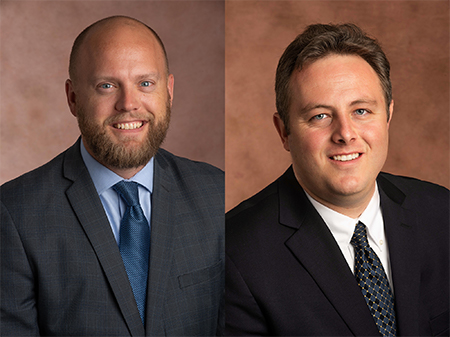
When they were named co-chiefs of the new Program in Medical Ethics, Humanities, and Law at WMed in 2015, Tyler Gibb, JD, PhD, and Michael Redinger, MD, MA, envisioned that their work would become an integral part of the medical school curriculum, that the program would one day transition into an academic department.
In April, their vision became reality.
The program transitioned April 1 to the Department of Medical Ethics, Humanities, and Law and Drs. Gibb and Redinger became department co-chairs. Drs. Gibb and Redinger were each promoted from assistant professor to associate professor through the regular promotion, also effective April 1.
“This was always the goal and the timeline we were hoping to hit,” Dr. Gibb said recently. “I couldn’t be more happy or proud about it.”
When the Program in Medical Ethics, Humanities, and Law was established six years ago, Drs. Gibb and Redinger, along with Founding Dean Dr. Hal B. Jenson, identified key milestones to hit for the program to be elevated to an academic department. Since that time, a number of accomplishments have been achieved:
- The creation of undergraduate and graduate medical curricula in medical ethics, medical humanities, health law, and health policy at WMed.
- The revitalization of the ethics committees and ethics consultation services at WMed Health, Ascension Borgess, and Bronson Health.
- Consistent contribution to collaborative scholarly works that have been published in significant medical and bioethical journals.
- The establishment of local, national, and international partnerships, including with the UNESCO Chair in Bioethics.
Drs. Gibb and Redinger acknowledged that their success would not have been possible without the support of WMed leader, specifically Dr. Jenson.
“Our status as a department indicates that this is something that is a long-term commitment by the institution and that it is essential to WMed’s identity,” Dr. Redinger said.
Dr. Redinger said he has been especially proud of how – during the last 15 months – faculty in the Department of Medical Ethics, Humanities, and Law have provided valuable guidance to local hospitals and healthcare workers from across the state as they navigated challenging discussions and difficult decisions during the COVID-19 pandemic.
Additionally, both Dr. Redinger and Dr. Gibb said they’ve also been energized during the last six years by the feedback they have received from former medical students who are now in residency training.
“When they go into residency, they feel like they are farther ahead of their colleagues in terms of understanding and applying ethical concepts and using their ethical reasoning and their appreciation of the medical humanities, Dr. Redinger said. “I think the true success is in our students walking away from their experience at WMed and saying our faculty and curriculum were a key part of it.”
Currently, the Department of Medical Ethics, Humanities, and Law includes 13 faculty who are part of a unique, multidisciplinary academic program focused on historical, perennial, and emerging issues related to the practice of modern medicine.
“The transition from a program to a department is a sign that recognizes the growth and impact of these faculty in medical ethics education and scholarly activities,” Dr. Jenson said. “It is also a sign of continued growth and maturation of the medical school.”
As they look ahead, Dr. Gibb said he and Dr. Redinger are focused on expanding the number of faculty in the department and building a national profile beyond Michigan through continued research efforts an scholarship.
“I feel like we’ve had role in helping shape the cultural aspects of WMed and that’s something in the future where we see the opportunity to create a department that is nationally recognized as a center of excellence,” Dr. Gibb said. “Other notable ethics centers are at places where there is a critical mass of interest, support, and creativity and we feel like we have a strong foundation for that at WMed.”
